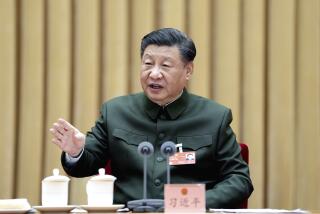Chinese Web Activist Gets Suspended Sentence
- Share via
HONG KONG — High-profile Chinese Internet essayist Du Daobin, who was convicted of “subverting state power,” received a suspended sentence from a Chinese court Friday and was allowed to return home for the first time since he was arrested eight months ago.
“I’m so excited to see him again,” Du’s wife, Xia Chunrong, said in a telephone interview. “He has lost some weight but is in quite good spirits. Our son was so happy to see his father. They’re glued together now.”
The court sentenced Du, 39, to three years in prison for his activism, but suspended the penalty.
Although Du’s family was happy with the relatively light sentence, human rights and free-speech activists said the government’s use of state-security charges and restrictions on Du’s future activities left little to celebrate.
“This will send a chilling message to all those who use the Internet as a forum for expression,” said Nicholas Becquelin, the Hong Kong-based research director of Human Rights in China. “It tears down the myth that freedom of the Internet is pushing forward in China.”
Du will be allowed to remain at home, assuming he does not appeal. The family was mulling its options. If Du accepts the court’s decision, he must report to the public security bureau weekly for the next four years and refrain from giving interviews, traveling or writing on the Internet -- the medium least accessible to government control -- without prior approval.
Du was convicted, according to the official New China News Agency, of “overtly instigating and subverting the state power by way of slander” for filing 26 essays online between May 2002 and October 2003.
The news service added that the court was lenient with Du because he “was quite cooperative during interrogation.”
Du’s lawyer Mo Shaoping, however, objected to the sentence and the suggestion that his client was guilty. “He’s only using his constitution-endowed right of freedom of speech,” Mo said. “He’s written over 300 articles of over 1.5 million words on the Internet, yet the government picks out 26 articles and accuses him on that basis.”
Analysts attributed Du’s relatively lenient sentence in large part to pressure by foreign governments and international civic groups. Du attracted widespread attention for his measured, well-argued essays challenging the government’s authority to control expression and for defending another Internet writer, Liu Di, a student known by her online moniker, “Stainless Steel Mouse.”
Ultimately, Du’s defense of Liu may have had its intended effect -- she was released after a year of detention -- but he paid a high price when he was detained.
Untold numbers of activists in China are often subject to far harsher treatment, yet never attract international attention, other observers said.
“It’s good news that he will be released,” said Vincent Brossel of Reporters Without Borders. “But we’re monitoring 63 cases of Web users, many in jail, most of them outside Beijing or the big cities, with almost no one taking notice of them.”
Despite Du’s suspended sentence, the decision to invoke China’s state security statutes against him signals that the government will allow no challenge in the area of Internet expression, some analysts said. Earlier government reports accused Du of accepting money from unspecified foreign regimes.
“They adopted a sledgehammer approach,” Becquelin said. “Du Daobin clearly doesn’t represent a threat to the state.”
The tactics put pressure on activists to censor themselves, some said. Given the notoriety of Du’s case, analysts believe that the directive came from the highest levels of China’s government.
Authorities reportedly characterized the trial as open. But international groups say it had the earmarks of a “soft closed-door trial” in which the government packs the spectator seats with civil servants and police to curb access to outside observers.
Du’s case was the subject of a petition this year signed by 100 lawyers and activists that urged Beijing to clarify the country’s vague subversion laws.
“I don’t know much about the law,” said his wife, Xia. “And it’s hard to say whether the sentence is fair or not. To me and my boy, however, just being with him is the greatest satisfaction we can expect.”
Yin Lijin in The Times’ Beijing Bureau contributed to this report.
More to Read
Sign up for Essential California
The most important California stories and recommendations in your inbox every morning.
You may occasionally receive promotional content from the Los Angeles Times.










